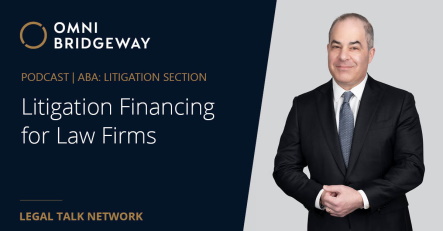Omni Bridgeway’s Jason Levine on Legal Finance for Law Firms and Corporate Clients

For forward-thinking law firm leaders, dispute finance is viewed as a financial and business development tool that can allow them to decrease risk and maximize realization. Speaking on a recent litigation podcast, Omni Bridgeway’s Jason Levine said, “nowadays, if a large law firm doesn’t have a good relationship with at least one reputable litigation finance company…that firm is at a disadvantage.”
Levine is a former Big Law equity partner, practice group leader, and litigator who joined Omni Bridgeway earlier this year as an investment manager, legal counsel, and head of the company’s antitrust litigation initiative.
In a recent episode of Litigation Radio, a podcast sponsored by the litigation section of the American Bar Association, Levine covered a wide-range of funding topics in a discussion with Dave Scriven-Young, a litigator in the Chicago office of Peckar & Abramson. Here are a few of the highlights of their discussion:
Defining Dispute Funding
At its heart, Levine noted, commercial litigation finance “is a way for companies and law firms to turn legal claims and judgments into immediate revenue-generating assets.” A financing arrangement enables companies to eliminate litigation costs by obtaining third-party funding for legal fees and expenses in affirmative litigation. In exchange, the funder receives an agreed-upon portion of a successful recovery.
Funding can also allow law firms “to monetize contingent fees by receiving payment for a portion of those fees from a funder as the case is being litigated,” Levine said. “Again, this is in exchange for an agreed upon piece of the contingent fee that would be awarded at the end of a successful recovery.” Both companies and law firms can also get working capital, in exchange for part of the recoveries they obtained in cases. And financing can be done for single cases or for portfolios of cases, he said.
“Most importantly, commercial litigation finance is non-recourse. This means that if the claimant or law firm is unsuccessful, or only gets a small recovery, the funder has no recourse against the claimant or the law firm that it's funding,” Levine said.
Key Terms of a Funding Agreement
Levine also described four important terms of a funding agreement. One is the non-recourse nature of the funding as mentioned above. Another key term is the amount to be funded. “Our typical minimum investment is a million dollars,” he said, while noting that most investments are larger and vary significantly in size.
In addition, “the return structure for the funder is crucial,” Levine said. For funders in general, he explained, “[i]t's usually some combination of, or variation on, a multiple of invested capital and a percentage of the recovery.” And finally, the agreement will include the priority of payment. “We call that the waterfall,” Levine said. While specific terms may vary, the funder will usually prefer to be first in line for repayment for at least its invested capital. “A waterfall really becomes important if the resolution of the case doesn't produce enough proceeds to pay everyone in full. Otherwise, it likely doesn't come into play,” Levine said.
Joining a Funder
Levine also discussed his decision to leave his law firm partnership to join Omni Bridgeway. “My new role lets me combine my litigation experience with financial analysis and with dealmaking in a new and a unique way,” Levine said. He cited the explosive growth of funding investments during the last few years and the scope of law firms and corporate clients now working with funders. “I really wanted to be a part of that,” Levine said. Omni Bridgeway, he added, is “growing rapidly, and we have a large amount of investment capital, so I think it’s a great time to be in this business.”
The full episode of the podcast is posted on the Legal Talk Network, as well as other podcasting platforms. Among several other issues, Levine discussed the due diligence process that a funder conducts when making an investment, the continuing change in perceptions about commercial litigation funding among major law firms and corporations, and the fact that funders like Omni Bridgeway exert no control over the matters they finance.
Learn more about legal finance here. For information about how we can assist claimants in a variety of commercial disputes, visit our Company Insights or contact us for a consultation to learn more about the ways we can help you and your clients unlock the value of meritorious claims.